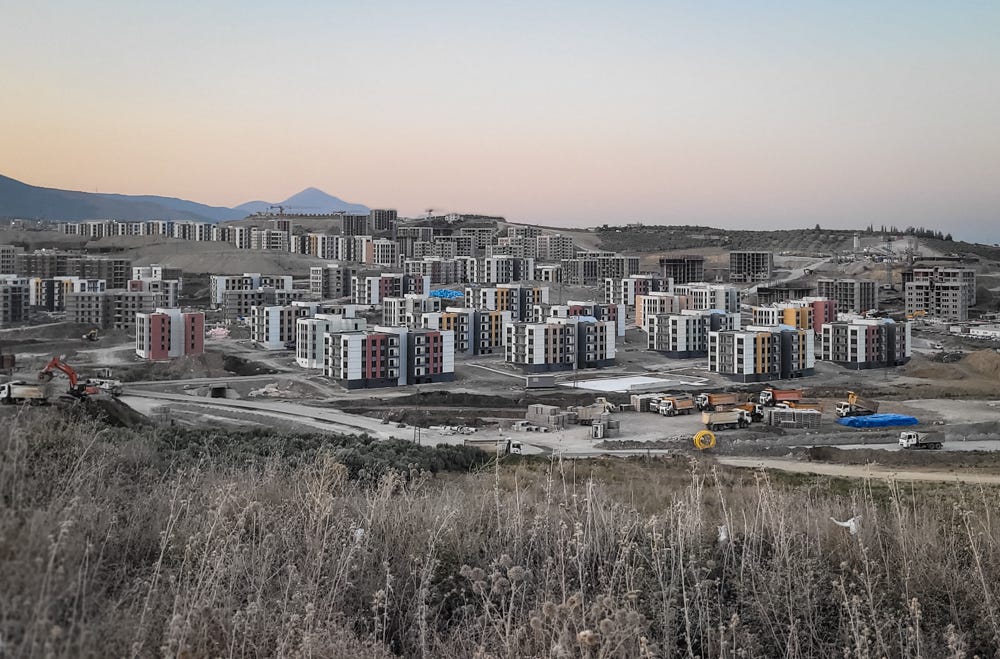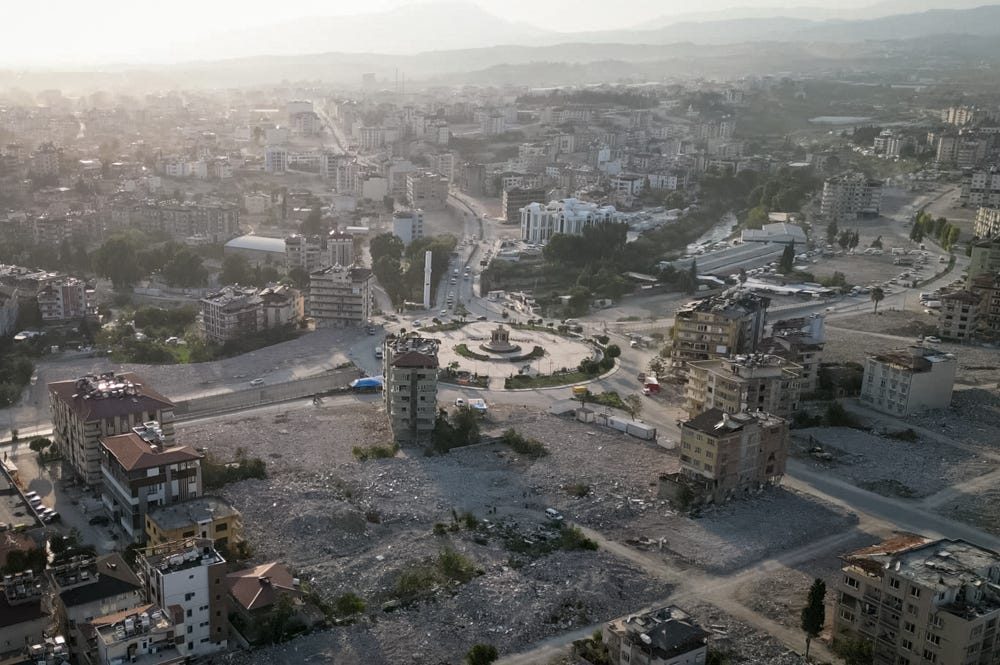HATAY — Antakya's Esenlik neighborhood was once a vibrant community filled with apartment blocks and gardens – the sound of children playing echoed in the air. Now, more than one and a half years after the February 2023 earthquakes in southern Turkey, it is difficult even to call it a neighborhood. Instead, it resembles a giant construction site.
On an early August evening, no children are around, just earth-moving trucks and the dust clouds that follow them. Only a few buildings remain in Esenlik. In one, newly washed clothes hang on the balconies. In front of it, the Balsever family sits on plastic chairs beneath the dim glow of a street light.
The five-story apartment building survived the twin earthquakes on Feb. 6 and a significant aftershock two weeks later. The structure was then approved for renovation and reinforcement work last summer. Despite this, the government now wants to demolish the building under its "reserve area" plans.
In July, officials cut the building's power and water after the family refused to heed legal notices to leave the site. The Balsevers are waiting for a court decision on their appeal and rely on generators and jugs of water to meet their basic needs in the meantime.
"If it were God who destroyed my house, I'd be okay with it," Hasan Balsever, the owner of the building and the head of the family, told Turkey recap.
"But it survived [the earthquakes] and now the state wants to demolish it," he continued. "I don't accept that. We won't leave our house. Even if we do, where would we go in a city without enough houses?"
The Balsevers are among the countless families in Hatay who have yet to secure safe accommodation following the earthquakes. Along with many local property owners, the Balsevers are now determined to keep their house at a time when the province still lacks proper sheltering alternatives.

Reserved to seize
Like other families facing eviction, officials previously approved the Balsever building as habitable. However, hundreds of families in Hatay have received eviction notices as a result of the "reserve area” regulation the government passed last November.
The regulation allows the government to take over properties in residential areas deemed at risk of disaster nationwide, including those in the earthquake-prone areas.
Property owners in designated reserve areas were promised the opportunity to receive a new property after contributing to construction costs. However, the government has not explained how it determined these reserve areas or provided specific details about the new properties.
Additionally, no information has been disclosed regarding the financial responsibilities of affected owners. How much compensation they’ll receive for their houses, lots or business is up to officials, and an information pamphlet shared by the state says the “discounted” price they’ll pay will be determined by the Presidency after the completion of each project.
The lack of transparency is causing further uncertainty and hardship for the impacted families.
The government said the new “reserve area” regulation aimed to expedite reconstruction efforts, and government officials from several institutions told Turkey recap citizens should trust the state when applying the law.
While they agree that comprehensive projects for specified regions can accelerate the rebuilding process, opposition politicians and local residents criticize the ongoing practices and demand more clarity.
Turkey recap interviewed many residents facing eviction notices who said they were determined not to leave their properties until legal processes were finalized.
Integrity disruptions
Hasan Balsever is a former truck driver who worked 40 years in Arab countries – like many Hatay workers due to the provinces’ multi-lingual heritage and limited employment options. Ten years ago, he built the apartment with his savings. Eight families live in the building with relatives and renters, including the elderly and disabled.
The building didn't suffer significant damage during the Feb. 6 earthquakes. However, the family left Hatay for the first few months following the disaster. When they returned, Balsever visited the province’s Environment and Urban Planning Department to ask about the building’s status. The officials said that they could move back after renovations.
The Balsevers followed the state’s instructions and renovated their building. The family started living in their old apartment last summer. But a couple of months later, they received an eviction notice. Officials told them their building was foiling the reserve area plans and needed to be demolished.
“I didn’t avoid any expenses during the construction,” Balsever told Turkey recap. “They took samples, and those showed that this building is safe too, but they still want to demolish it because it disturbs the integrity of the project. I don’t accept that.”
Awaiting the turn
In another neighborhood in Antakya, Yılmaz Özgün spends a Sunday afternoon at home. “I can’t go out and enjoy the day,” he told Turkey recap. “Because they can come anytime and demolish my home.”
The Akevler neighborhood consists mainly of single-family houses, and almost none suffered damage during the earthquakes. Yet, the neighborhood was still deemed a “reserve area,” and residents received eviction notices in May. Almost all the residents of the 300 houses affected by the reserve area plans for the neighborhood refused to leave their properties and started a legal process, but it hasn’t stopped attempts to demolish the buildings.
“We all act together,” Özgün continued, referring to the neighborhood watch to stop any attempts at demolishing their buildings. “If one person leaves the neighborhood, they let others know. We have our guards up all the time. We’ll stay here.”
Hasan Özgün from the “No To Reserve Platform” told Turkey recap that many people in Antakya constantly fear losing their homes.
“They don’t know where to go if their houses are demolished,” Özgün said, adding another reason for concern was the unclear definitions in the law. “Officials told people ‘we’d build their houses at the same place and deliver a key for a key. But the law doesn’t say so,’” he added.
Law No. 6306 on the Transformation of Areas Under Disaster Risk has allowed the Ministry of Environment and Urbanization to expropriate properties in reserve areas “if necessary” since November. The conditions for the necessity are undefined, but the law states that the ministry can give houses or workplaces to beneficiaries from other projects.
“If they want,” Özgün continued, referring to the government. “They can take your house and give you one in return in another district. They don’t even have to give you a house in Hatay, it can be anywhere and people don’t want that.”
According to information the Hatay Governorship shared with Turkey recap, more than 270,000 people in Hatay still live in containers, 80 percent of which are in the government's container camp areas. The rest live in the remaining or renovated buildings in the province, mainly in rural areas. Rental options in the city center, Antakya, are still limited, and prices are high.
In Hatay, the Turkish Housing Development Administration (TOKİ) and Emlak Konut, a real estate developer under TOKİ, delivered keys to around 3,600 houses in the first 18 months of the disaster. By the end of 2025, the aim is to complete 136,000 houses in six districts of the province.
Swallowing words
Servet Mullaoğlu, a Hatay MP for the Republican People’s Party (CHP) and a lawyer, told Turkey recap Law No. 6306 also consists of a vague termination in terms of the payment.
“Every project will have a different payment plan,” he said. “It will change from neighborhood to neighborhood and no one knows how much they’ll pay.”
Officials from AFAD, the country’s Disaster and Emergency Management Authority, which supervises the whole post-earthquake process and is in charge of the disaster housing payments, had previously told Turkey recap for a separate report that prices differ between cities and locations within the city had been approved depending on building costs.
According to Mullaoğlu, reserve areas could have been a good call to accelerate the rebuilding process, but he felt the government’s haphazard management resulted in a lack of trust in the state.
“At first, officials told people they wouldn’t demolish the standing buildings,” Mullaoğlu explained. “But they realized it wasn’t possible to conduct construction without damaging the buildings around the area. Now, they want people to suffer for their mistake.”
In November, former Environment and Urbanization Min. Mehmet Özhaseki said in a TV interview that reserve areas wouldn’t include the buildings people already live in. One month later, former Deputy Min. of Environment and Urbanization Vedad Gürgen also stated in a Hatay meeting that the government wouldn’t seize anyone’s house and that plans would be created according to people’s demands.
Their words were quickly challenged by the facts on the ground. As rebuilding plans did not apply their promises, Özhaseki was the first minister replaced in Pres. Recep Tayyip Erdoğan’s post-2024 election cabinet reshuffling this July. Gürgen was also removed from his position a few weeks later.
“[The government] didn’t plan it in the beginning,” Mullaoğlu continued. “People don’t believe in them anymore and don’t want to leave their houses. There is only one way to solve this, and it is by revising the project. If they try to evict people by force, we’d be there as CHP to resist.”
The provincial director of Environment and Urban Planning in Hatay, İsmail Ceylan, told Turkey recap that as officials, they were determined to do whatever the law requires.
“We’ll do what Law 6306 says,” Ceylan said. “If houses are in the reserve area and do not fit the project’s integrity, we’ll evict people living in them. The people of Hatay should trust the state. Everything passes, but what really matters is the state.”
Ceylan claimed that no citizen would suffer losses, promising, “They will not be victimized. We are a big family in Hatay. We will do whatever it takes for our family.”
“They tell us to believe in the state,” Balsever said. “But they don’t say how. How can we trust the state without a legal guarantee? [Officials] already told us we could go back and live in our home. If they were going to demolish it, why did they let us repair our home?”
This newsletter is supported by readers via Substack and Patreon. Paid subscribers get full access to our recaps, reports, members-only Slack and news tracking tools. All proceeds go towards sustaining our journalism.
Turkey recap is produced by the Kolektif Medya Derneği, an İstanbul-based non-profit association founded by our editorial team to support and elevate news media and journalists in Turkey. Contact us: info@turkeyrecap.com
Diego Cupolo, Editor-in-chief @diegocupolo
Gonca Tokyol, Editor-at-large @goncatokyol
Ingrid Woudwijk, Managing editor @deingrid
Verda Uyar, Digital growth manager @verdauyar
Emily Johnson, Deputy editor @emilyjohnson
Damla Uğantaş, Tr Türkçe editor @damlaugantas






